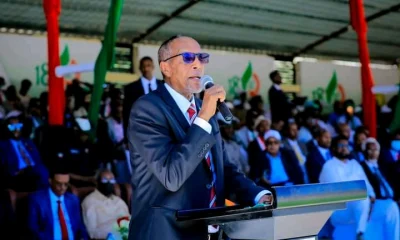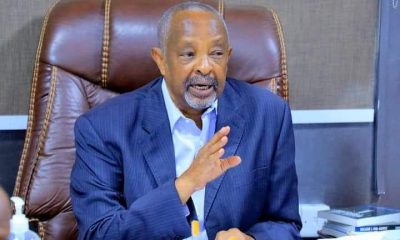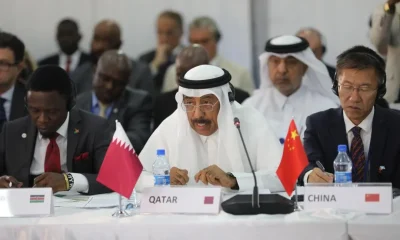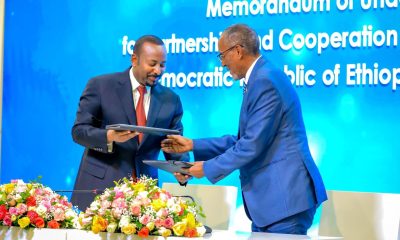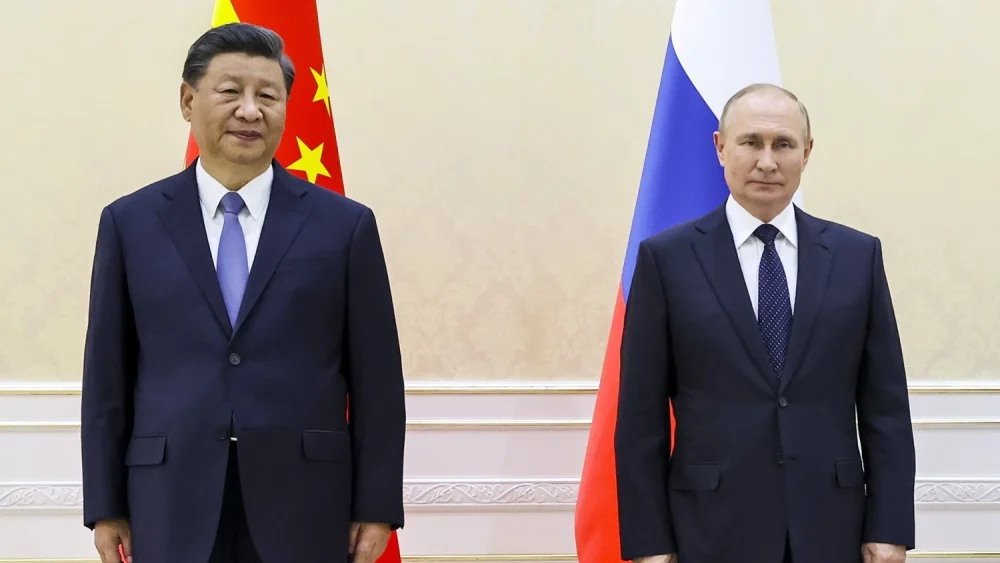Editor's Pick
From the Bush to the City: Ahmed Farah’s Journey of Discovery

Ahmed Farah, a timid and uneducated young man born in the rural outskirts of Baadiye, dreamt of a life beyond the endless expanse of bushland that surrounded his village. With his yellow-bellied nature and a heart filled with trepidation, he had grown accustomed to the simple, uncomplicated life of his hometown. But deep down, a flicker of curiosity burned within him, urging him to venture beyond the familiar and explore the unknown.
One fateful day, Ahmed heard whispers of the bustling city of Hargeisa, the capital of Somaliland, where dreams were said to come true and fortunes were made. Ignorant of the ways of the urban world, Ahmed felt both exhilarated and apprehensive at the prospect of leaving behind the safety of his village and embarking on a journey into the unknown.
As Ahmed stepped foot into the vibrant streets of Hargeisa, he was immediately overwhelmed by the sights and sounds of the city. Towering buildings loomed overhead, casting long shadows over the bustling marketplaces and crowded alleyways. Ignoramus to the ways of city life, Ahmed felt like a fish out of water, his naive eyes wide with wonder and fear.
In his quest to navigate the labyrinthine streets of Hargeisa, Ahmed soon found himself enticed by the allure of khat, a potent stimulant that promised a brief escape from his timid existence. Falling prey to his own ignorance and the influence of others, Ahmed found himself drawn into a world of vice and temptation, where illusions of grandeur masked the harsh realities of city life.
As Ahmed wandered the streets of Hargeisa, he was approached by a group of city children who sensed his vulnerability and saw an opportunity for mischief. Ignorant of their ulterior motives, Ahmed fell victim to their deception, losing what little money he had to their cunning ploys. His heart filled with despair, Ahmed realized that the city was not the paradise he had imagined, but rather a harsh and unforgiving landscape where the weak were preyed upon by the strong.
Despite the trials and tribulations he faced, Ahmed refused to succumb to despair. With newfound determination, he sought out the guidance of wise elders who had weathered the storms of city life and emerged stronger for it. Through their teachings, Ahmed learned to navigate the complexities of the urban jungle, finding strength in his own resilience and courage in the face of adversity.
As Ahmed’s journey unfolded, he discovered that true courage was not the absence of fear, but the willingness to confront it head-on. Through his encounters with the diverse inhabitants of Hargeisa, Ahmed learned to embrace his own vulnerabilities and celebrate the richness of human experience. Armed with newfound wisdom and a renewed sense of purpose, Ahmed embarked on a journey of self-discovery, determined to carve out his own path in the bustling metropolis of Hargeisa.
Though Ahmed Farah’s journey was fraught with challenges and setbacks, his story serves as a testament to the power of resilience and the transformative potential of adversity. From his humble beginnings in the bush to his triumphant emergence as a fearless denizen of the city, Ahmed’s tale reminds us that true courage lies not in the absence of fear, but in the willingness to confront it with unwavering determination and unyielding resolve.
Analysis
Xi lauds China-Russia ties as Putin lands in Beijing
Editor's Pick
James Swan Reappointed as UN Special Representative for Somalia
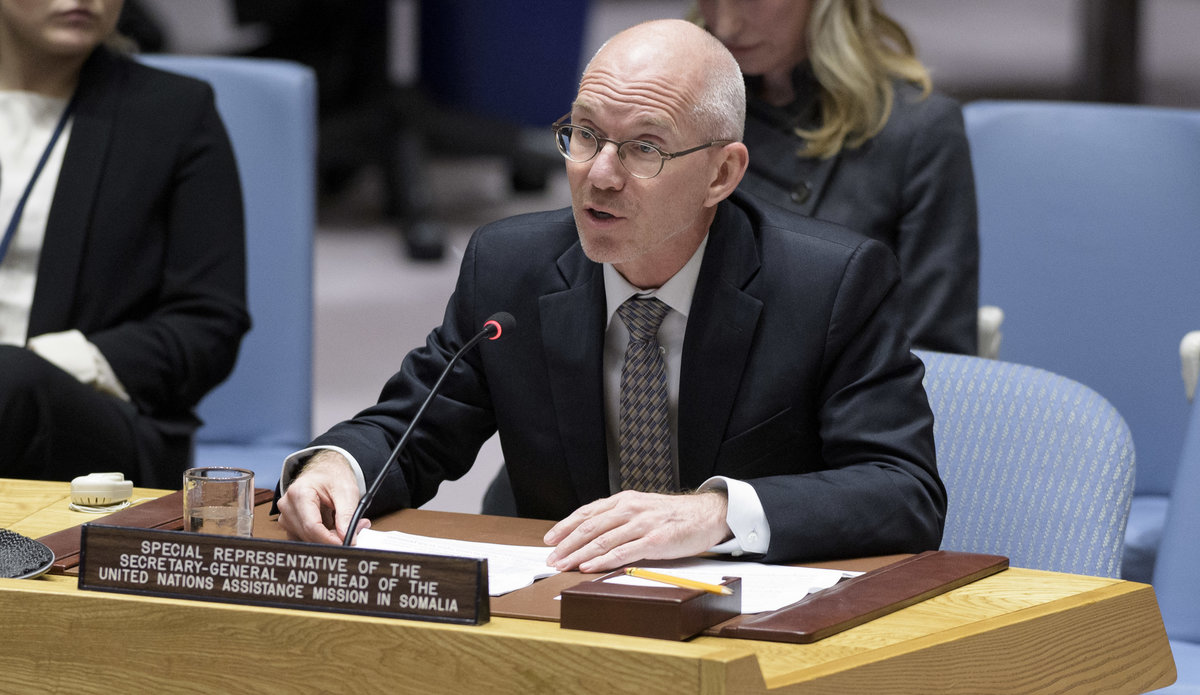
By Kasim Abdulkadir:
United Nations Secretary-General António Guterres appoints James Swan as his special representative for Somalia, a role he previously held during the highly contested 2021 election.
United Nations Secretary-General António Guterres has reappointed James Swan, a seasoned diplomat from the United States, as his special representative for Somalia. Swan, who previously served in this capacity during the tumultuous 2021 election, will also lead the United Nations office in Somalia.
Swan’s appointment comes at a critical juncture for Somalia, as the country grapples with political disputes and constitutional amendments. His extensive experience in diplomatic affairs, including previous roles as the US Deputy Assistant Secretary of State for African Affairs and as the special representative of the United States government for Somalia, positions him well for the challenges ahead.
During his previous tenure, Swan played a significant role in facilitating dialogue and reconciliation efforts, particularly amidst the highly contested 2021 election. His diplomatic finesse and strategic acumen were instrumental in navigating complex political landscapes and fostering constructive engagement among various stakeholders.
The United Nations office in Somalia, under Swan’s leadership, will continue to prioritize reconciliation activities, peacebuilding initiatives, and the promotion of human rights. Additionally, the office remains committed to supporting Somalia’s federalization process, strengthening governance structures, and fostering economic recovery.
UNSOM’s Demise: Somalia’s Descent into the Abyss of State Collapse
However, Swan’s reappointment comes amidst uncertainty, with discussions underway regarding the potential closure of the United Nations office in Somalia. Despite these challenges, Swan’s diplomatic leadership and commitment to advancing peace and stability in Somalia are poised to make a significant impact.
As Somalia navigates through political upheavals and constitutional reforms, Swan’s return as the UN special representative underscores the international community’s unwavering support for the country’s peace and development agenda. His tenure is expected to be marked by continued engagement with Somali authorities and regional governments, as well as proactive efforts to address emerging challenges and opportunities on the path towards lasting peace and prosperity.
Editor's Pick
Australia plans limits on international students

Australia to Impose Limits on International Student Numbers
BY GUEST ESSAY:
Australia has unveiled plans to introduce limits on the number of international students allowed to study in the country. The move has sparked debate over the potential implications for the education sector and the broader economy.
The proposed limits come amidst growing concerns about the strain on infrastructure and public services in major cities, where a significant portion of international students reside. The influx of students has also raised questions about housing affordability and job opportunities for local residents.
While international education is a lucrative industry for Australia, contributing billions of dollars to the economy each year, critics argue that the focus on quantity over quality has led to issues such as exploitation of foreign students and declining academic standards.
Proponents of the new restrictions argue that they are necessary to address overcrowding and ensure that resources are allocated more effectively. They also point to the need to prioritize the interests of Australian citizens and residents, particularly in light of the challenges posed by the COVID-19 pandemic.
However, opponents warn that imposing limits on international student numbers could have negative consequences for the education sector, including reduced revenue for universities and job losses in related industries such as hospitality and tourism.
The announcement has reignited discussions about the role of international education in Australia’s economic recovery and its broader significance for the country’s cultural diversity and global reputation. It has also prompted calls for a more balanced approach to managing student intake, taking into account both economic and social considerations.
As the government moves forward with its plans to implement limits on international student numbers, stakeholders across the education sector are closely monitoring developments and advocating for policies that strike the right balance between economic growth and social responsibility.
Editor's Pick
Biden sharply hikes US tariffs on billions in Chinese chips, cars

Biden Administration Escalates Tariffs on Chinese Chips and Cars
BY GUEST ESSAY:
Explore the latest move by the Biden administration to sharply increase tariffs on Chinese chips and cars, analyzing its impact on trade relations and global supply chains.
In a significant escalation of trade tensions between the United States and China, the Biden administration has announced a sharp increase in tariffs on billions of dollars’ worth of Chinese chips and cars. The move marks a departure from the previous administration’s approach and signals a tougher stance on trade with China.
The decision to hike tariffs comes amid growing concerns about China’s trade practices and alleged unfair competition in key industries such as semiconductor manufacturing and automotive production.
The Biden administration has cited the need to protect American industries and jobs as a primary motivation for the tariff increase.
Under the new measures, tariffs on certain Chinese-made semiconductor chips will nearly double, while tariffs on imported Chinese cars and auto parts will also see a significant increase. The move is expected to impact a wide range of industries and could disrupt global supply chains that rely on Chinese-manufactured components.
The decision to sharply hike tariffs reflects the Biden administration’s broader strategy of prioritizing American interests in trade negotiations with China. President Biden has repeatedly emphasized the need to address China’s trade practices, including intellectual property theft, forced technology transfer, and unfair subsidies to domestic industries.
However, the move has drawn criticism from some quarters, with opponents warning that higher tariffs could ultimately harm American consumers and businesses. Critics argue that tariffs function as a tax on imported goods, leading to higher prices for consumers and potentially sparking retaliation from China.
Moreover, the escalation of tariffs could further strain relations between the world’s two largest economies and complicate efforts to address other pressing issues such as climate change, cybersecurity, and regional security. The Biden administration has sought to engage with China on areas of mutual interest while pushing back against perceived economic threats.
The decision to sharply increase tariffs on Chinese chips and cars underscores the challenges facing the Biden administration in managing its relationship with China. Trade tensions between the two countries have persisted for years, with both sides imposing tariffs on billions of dollars’ worth of goods.
As the Biden administration seeks to navigate these challenges, it faces pressure to balance competing interests and priorities. The move to hike tariffs on Chinese chips and cars reflects a broader strategy of promoting American competitiveness and protecting critical industries, but it also carries risks of economic disruption and further deterioration in bilateral relations.
As the situation continues to evolve, the impact of the tariff increase on global trade and supply chains remains uncertain. The Biden administration will need to carefully monitor developments and assess the effectiveness of its trade policies in achieving its broader economic and strategic objectives.
Editor's Pick
Evidence bomb goes off: Star witness Cohen pins porn payment on Trump

The latest revelations from Michael Cohen, unveiling Trump’s alleged involvement in hush money payments to a porn star, shedding light on legal and political implications.
BY GUEST ESSAY:
Michael Cohen, former attorney and fixer for Donald Trump, has disclosed that Trump allegedly ordered a hush money payment to a porn star. The revelation adds another layer of controversy to the tumultuous tenure of the former U.S. president, raising significant legal and political questions.
According to Cohen, Trump directed him to arrange a payment of hush money to Stormy Daniels, an adult film actress, to silence her about an alleged affair with Trump prior to the 2016 presidential election. Cohen’s admission provides further evidence of Trump’s involvement in efforts to conceal potentially damaging information during his presidential campaign.
The revelation has sparked renewed scrutiny into Trump’s conduct and could have significant legal implications. Campaign finance laws prohibit the use of corporate funds for political purposes, raising questions about the legality of the hush money payment and whether it constituted an illegal campaign contribution.
Moreover, Cohen’s disclosure could bolster ongoing investigations into Trump’s financial dealings and potential violations of campaign finance laws. Special prosecutors and congressional committees have been probing various aspects of Trump’s finances and conduct, and Cohen’s testimony could provide valuable insights into these investigations.
From a political perspective, the revelation could further erode Trump’s already tarnished reputation and damage his prospects for a political comeback. Allegations of misconduct and ethical lapses have dogged Trump throughout his presidency and beyond, and Cohen’s testimony adds fuel to the fire of public scrutiny.
However, Trump and his allies have dismissed Cohen’s claims as baseless and politically motivated. They have characterized Cohen as a disgruntled former employee seeking to settle scores with his former boss, casting doubt on the credibility of his allegations.
Despite these denials, Cohen’s testimony adds to the mounting legal and political challenges facing Trump and his inner circle. The revelation underscores the importance of accountability and transparency in government and highlights the need for thorough investigations into allegations of wrongdoing.
As the legal and political fallout from Cohen’s revelation unfolds, the American public will be watching closely to see how Trump and his allies respond. The controversy surrounding the hush money payment to a porn star adds another chapter to the ongoing saga of Trump’s tumultuous presidency, shaping the political landscape for years to come.
Editor's Pick
Conflict, violence push global internal displacement to record high levels

The number of internally displaced people around the world is at a record high – well over 70 million – it’s a global crisis
Explore the factors behind the surge in global internal displacement as conflict and violence reach record highs, shaping the humanitarian crisis worldwide.
BY GUEST ESSAY:
Amidst escalating conflict and violence across various regions, global internal displacement has soared to unprecedented levels, exacerbating the humanitarian crisis on a global scale. The surge in displacement reflects the grim reality faced by millions of individuals and families who are forcibly uprooted from their homes, seeking safety and refuge amidst the chaos of conflict.
From the ongoing conflicts in the Middle East to the civil unrest in Africa and beyond, the root causes of internal displacement are varied and complex. Political instability, ethnic tensions, economic hardships, and environmental disasters all contribute to the displacement crisis, driving millions of people from their homes and communities.
The impact of internal displacement is profound, with individuals and families facing immense challenges as they struggle to rebuild their lives in unfamiliar and often hostile environments. Displaced populations are particularly vulnerable to poverty, hunger, and disease, with limited access to essential services such as healthcare, education, and employment.
Moreover, the psychological toll of displacement cannot be overstated, as individuals grapple with the trauma of violence, loss, and displacement. The long-term effects of displacement on mental health and well-being are significant, with many individuals experiencing anxiety, depression, and post-traumatic stress disorder as they navigate the uncertainty of their circumstances.
As the global community grapples with the consequences of internal displacement, there is an urgent need for coordinated action to address the root causes of conflict and violence. Diplomatic efforts to promote peace and stability, as well as humanitarian assistance to support displaced populations, are essential components of a comprehensive response to the displacement crisis.
Additionally, efforts to strengthen the resilience of communities and improve access to essential services can help mitigate the impact of displacement and support the long-term recovery and reintegration of displaced populations. By addressing the underlying drivers of displacement and investing in sustainable solutions, the international community can work towards alleviating the suffering of displaced individuals and building a more inclusive and resilient world for all.
As internal displacement reaches record highs, the need for collective action and solidarity has never been greater. By addressing the root causes of conflict and violence and providing support to displaced populations, we can work towards a future where all individuals are able to live in safety, dignity, and peace.
Editor's Pick
‘Basil Fawlty’ hotel manager was so rude his comments will make your toes curl

Unveiling the Real-Life “Basil Fawlty”: Tales of Rudeness in Hotel Management
In a bizarre turn of events reminiscent of the iconic character “Basil Fawlty” from the classic British sitcom “Fawlty Towers,” a real-life hotel manager has garnered attention for his outrageous behavior, leaving guests aghast and bewildered.

Operating what can only be described as an “absolute dump” of a hotel, this hotelier’s conduct has reached legendary status, with reports of rudeness that would make your toes curl. Guests have recounted tales of encounters with this modern-day Basil Fawlty, whose antics defy belief.
From swearing at guests to creating chaos with his abrasive demeanor, the parallels between fiction and reality are striking. Much like the fictional character portrayed by John Cleese, this hotel manager’s behavior borders on the absurd, leaving a trail of disgruntled guests in his wake.
One guest described the hotel as a scene straight out of “Fawlty Towers,” with the manager embodying the role of Basil Fawlty to perfection. The experience was so surreal that it seemed like a comedy sketch unfolding in real life.
Despite the hotel’s dismal conditions, it is the manager’s behavior that has captured the public’s attention. His rudeness knows no bounds, and guests are left dumbfounded by the audacity of his remarks and actions.
The saga of the real-life “Basil Fawlty” serves as a cautionary tale for the hospitality industry, highlighting the importance of professionalism, courtesy, and respect in customer service. While “Fawlty Towers” may have been a work of fiction, the reality of encountering a hotel manager like Basil Fawlty is far from amusing.
As guests share their harrowing experiences and the hotel’s reputation plummets, one can’t help but wonder how such behavior is tolerated in the modern era. Perhaps it’s time for this real-life Basil Fawlty to take a lesson from the iconic character he unwittingly emulates and strive for a more hospitable approach.
Editor's Pick
Guam undergoes military buildup without additional border resources

Guam, a crucial strategic outpost in the Pacific, is undergoing a significant military buildup, but the expansion is unfolding against the backdrop of strained border resources. Despite the island’s pivotal role in regional security, concerns persist about the adequacy of resources to manage its borders effectively.
The military buildup on Guam is part of broader efforts to enhance defense capabilities in the Indo-Pacific region, reflecting shifting geopolitical dynamics and the growing strategic importance of the Pacific theater. The buildup includes the deployment of additional troops, the expansion of military infrastructure, and the reinforcement of Guam’s role as a forward operating base.
However, as Guam ramps up its military presence, questions arise about the capacity to manage the influx of personnel and the potential strain on existing border resources. Border security is a multifaceted challenge for Guam, given its unique geographical position and status as an unincorporated territory of the United States.
Guam’s border resources are tasked with addressing various threats, including illegal immigration, drug trafficking, and transnational crime. The island’s limited resources, coupled with its porous maritime borders, pose significant challenges to effective border management.
Amidst the military buildup, concerns have been raised about the need for additional resources to bolster border security and safeguard Guam’s sovereignty. The island’s authorities face the daunting task of balancing the imperative of supporting military operations with the need to maintain robust border defenses.
Efforts to address the resource constraints facing Guam’s border security apparatus are underway, but progress has been incremental. The island’s leaders are advocating for increased federal support and investment in border infrastructure, technology, and personnel to mitigate vulnerabilities and enhance situational awareness.
The complexities surrounding Guam’s military buildup underscore the intricate interplay between defense priorities and border security imperatives. As Guam navigates the challenges posed by its evolving strategic landscape, strategic foresight and proactive measures will be essential to safeguarding its interests and maintaining regional stability.
-

 Editor's Pick2 months ago
Editor's Pick2 months agoA Compelling Story of Friendship in Hargeisa
-

 Editor's Pick1 month ago
Editor's Pick1 month agoJihadism in Mozambique: southern African forces are leaving with mixed results
-

 Health1 month ago
Health1 month agoFinding Wholeness: A Woman’s Story of Overcoming an Eating Disorder
-
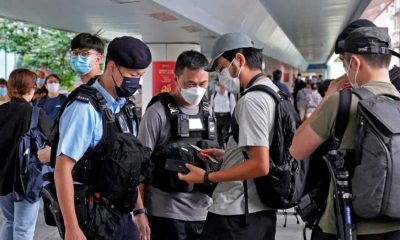
 Top stories1 month ago
Top stories1 month agoReport Exposes Surveillance and Harassment of Journalists Covering China
-

 EDITORIAL1 month ago
EDITORIAL1 month agoEmbracing the Underdog Spirit: A Call for Abdulahi Darawal and All Those Denied
-

 Top stories4 weeks ago
Top stories4 weeks agoMyanmar’s Myawaddy Conflict: KNU Rebels Resist Military Junta’s Repression, Heightening Tensions
-

 Top stories3 weeks ago
Top stories3 weeks agoIsrael’s far-right security minister Ben-Gvir injured in car accident
-

 Corruption2 weeks ago
Corruption2 weeks agoEXPOSING: Somalia’s Corrupt Economy and Terrorist Ties







